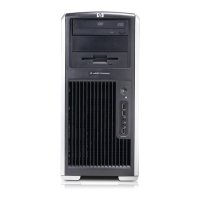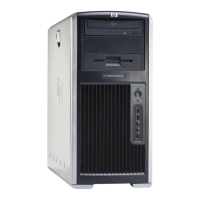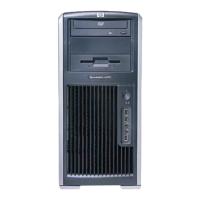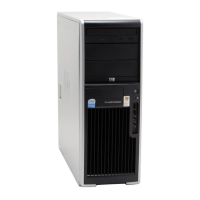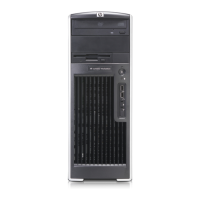Heading Option Description
Device
Security
Makes the following devices available or hidden to the system:
●
Serial Port
●
All USB Ports
●
External USB ports
●
Front USB Ports
●
System Audio
●
IEEE 1394 Controller
●
Network Controller 1
●
Network Controller 2
●
Onboard SAS Controller
●
Embedded Security Device
For each device, Device Available is the default setting and allows the operating
system access to the device. Device hidden makes the device unavailable; it
is disabled by the BIOS and cannot be enabled by the operating system.
When enabled, Embedded Security Device offers these options:
●
Enable/disable—Turns the TPM on/off.
●
Power-On Authentication Support—Enables/disables an authentication
feature that requires you to enter a TPM user key password to boot the
system. This feature uses the TPM to generate and store the authentication
password.
●
Reset Authentication Credential—Resets the authentication functionality
and clears all authentication credentials.
NOTE: A setup password must be set to enable the Embedded Security
Device and to access any security features associated with the Embedded
Security Device.
Network
Service
Boot
Enables/disables a Network Service Boot which boots using the NIC PXE
option ROM. In this case, the actual boot image resides on a remote server.
When enabled, you can set the boot order of the NIC PXE option ROM and you
can force a network boot by pressing F12 during POST.
System IDs Asset Tag
A 16–byte string identifying the system.
Ownership Tag
An 80–byte string identifying ownership of the system. This tag is displayed on
the screen during POST.
UUID (Universal Unique Identifier)
Can only be updated if the current chassis serial number is invalid. (These ID
numbers are normally set in the factory and are used to uniquely identify the
system.)
Keyboard
Enables you to set the keyboard locale for System ID entry.
Table 4-1 Computer Setup Utility menu descriptions (continued)
ENWW Computer Setup (F10) Utility 31
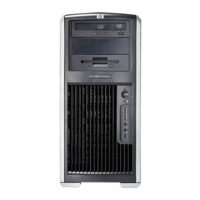
